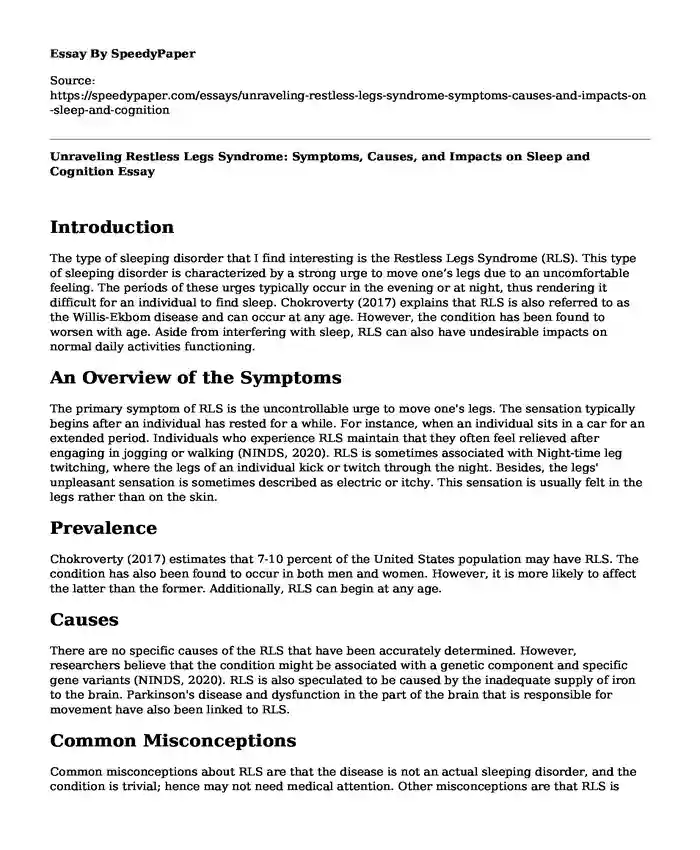
| Type of paper: | Essay |
| Categories: | Psychology Medicine Disorder |
| Pages: | 3 |
| Wordcount: | 592 words |
Introduction
The type of sleeping disorder that I find interesting is the Restless Legs Syndrome (RLS). This type of sleeping disorder is characterized by a strong urge to move one’s legs due to an uncomfortable feeling. The periods of these urges typically occur in the evening or at night, thus rendering it difficult for an individual to find sleep. Chokroverty (2017) explains that RLS is also referred to as the Willis-Ekbom disease and can occur at any age. However, the condition has been found to worsen with age. Aside from interfering with sleep, RLS can also have undesirable impacts on normal daily activities functioning.
An Overview of the Symptoms
The primary symptom of RLS is the uncontrollable urge to move one's legs. The sensation typically begins after an individual has rested for a while. For instance, when an individual sits in a car for an extended period. Individuals who experience RLS maintain that they often feel relieved after engaging in jogging or walking (NINDS, 2020). RLS is sometimes associated with Night-time leg twitching, where the legs of an individual kick or twitch through the night. Besides, the legs' unpleasant sensation is sometimes described as electric or itchy. This sensation is usually felt in the legs rather than on the skin.
Prevalence
Chokroverty (2017) estimates that 7-10 percent of the United States population may have RLS. The condition has also been found to occur in both men and women. However, it is more likely to affect the latter than the former. Additionally, RLS can begin at any age.
Causes
There are no specific causes of the RLS that have been accurately determined. However, researchers believe that the condition might be associated with a genetic component and specific gene variants (NINDS, 2020). RLS is also speculated to be caused by the inadequate supply of iron to the brain. Parkinson's disease and dysfunction in the part of the brain that is responsible for movement have also been linked to RLS.
Common Misconceptions
Common misconceptions about RLS are that the disease is not an actual sleeping disorder, and the condition is trivial; hence may not need medical attention. Other misconceptions are that RLS is natural and is a condition in the patient's head.
The Disorder's Impact on Cognitive Processes
RLS has a significant impact on sleep deprivation and, consequently, the cognitive processes of an individual. Chokroverty (2017) elaborates that the condition affects the pre-frontal cortical (PFC) functioning similar to individuals with acute sleep deprivation. Hence, these individuals suffer from a lack of mental flexibility and a decrease in attention.
The Disorder's Impact on Physiological Processes
Various studies have determined that RLS disturbs the sensorimotor cortex, thereby affecting an individual's physiological processes. The physiological defects involved a lower locus of control, depressive symptoms, decision-making problems, and impulsivity caused by a defect in the nervous system (sensorimotor cortex).
Proposed Medical and Psychological Treatments
Various medications exist for RLS. These include drugs that increase dopamine in the brain such as pramipexole (Mirapex), rotigotine (Neupro), and Ropinirole (Requip), drugs that affect Calcium such as gabapentin (Neurontin, Gralise), Opioids such as codeine and tramadol (Ultram, ConZip) and muscle relaxants (NINDS, 2020). Additionally, coping and support are other psychological remedies that can help alleviate RLS. Patients suffering from the condition are encouraged to seek help from support groups and tell others about their situation to be understood when they walk around uncontrollably.
References
Chokroverty, S. (2017). Oxford textbook of sleep disorders. Oxford University Press.
NINDS. (2020, March 17). Restless Legs Syndrome Fact Sheet. National Institute of Neurological Disorders and Stroke. https://www.ninds.nih.gov/disorders/patient-caregiver-education/fact-sheets/restless-legs-syndrome-fact-sheet.
Cite this page
Unraveling Restless Legs Syndrome: Symptoms, Causes, and Impacts on Sleep and Cognition. (2024, Jan 23). Retrieved from https://speedypaper.com/essays/unraveling-restless-legs-syndrome-symptoms-causes-and-impacts-on-sleep-and-cognition
Request Removal
If you are the original author of this essay and no longer wish to have it published on the SpeedyPaper website, please click below to request its removal:
- Essay Example: To Be or Not to Be Parody
- What Is Divorce - Essay Sample for Everyone to Check
- Mental Health and Depression, Free Essay Sample
- Free Essay Sample - Generalized Anxiety Disorder
- High-Risk Nutritional Risk - Free Paper
- DVT: A Risk To Inactive & Pregnant Women - Essay Sample
- Essay Example - Depression in Older People
Popular categories




